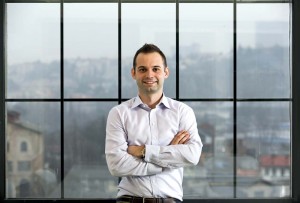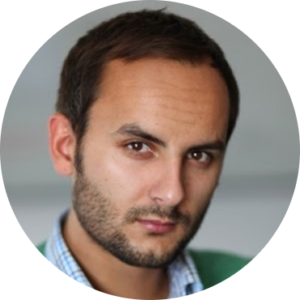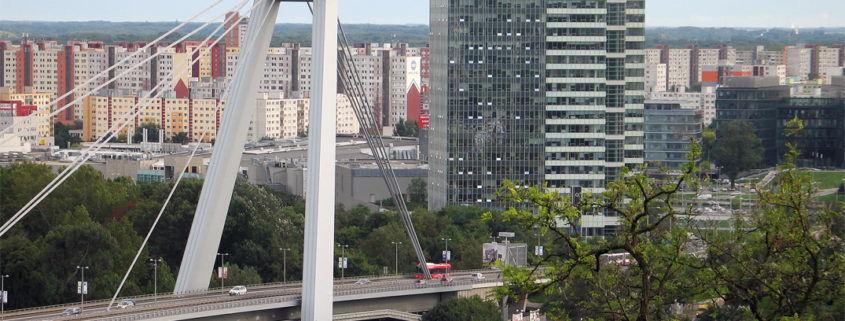What’s Special about the Slovak Tech Ecosystem?
StartupYard has embarked on a month-long, 8 stop tour of Central European tech capitals. We’ll be visiting Slovakia, Romania, Bulgaria, and Slovenia, and have already been in Kosovo, Albania, and Krakow, Poland as well.
Getting to Know The Slovak Tech Ecosystem
But before visiting each ecosystem for StartupYard FastLane, we wanted to get to know the ecosystems we will be visiting even better. While we’ve met a lot of startups from these countries, and accelerated some of them as well, we wanted to hear from local accelerators, investors, and entrepreneurs what they thought was special about their local ecosystem. Since we’re asking startupers to come to Prague, which we think is pretty special, we wanted to see what our neighboring ecosystems really have to offer, according to some of their biggest fans.
We asked a group of entrepreneurs and influencers in the countries we’re visiting to tell us their perspective on their own ecosystem, and we will share that learning with you in a series of blog posts, starting with this week’s post about Poland. Today, we’ll explore what makes the Slovak Ecosystem unique, ahead of our upcoming visit to The Spot on Tuesday, September 6th.
About Our Respondents:
 Andrej Kiska Jr, Credo Ventures: Kiska is a StartupYard Mentor, and a Partner at Central European tech VC firm Credo Ventures, where he has been since 2011. At Credo, Kiska sources and evaluates potential investments, while actively supporting existing portfolio companies in fundraising and growth. Though Kiska is based in Prague, he has deep ties to his native Slovakia, where his father has been President since 2014. Kiska was educated in the United States at the University of Virginia’s McIntire School of Commerce, where he studied finance and management.
Andrej Kiska Jr, Credo Ventures: Kiska is a StartupYard Mentor, and a Partner at Central European tech VC firm Credo Ventures, where he has been since 2011. At Credo, Kiska sources and evaluates potential investments, while actively supporting existing portfolio companies in fundraising and growth. Though Kiska is based in Prague, he has deep ties to his native Slovakia, where his father has been President since 2014. Kiska was educated in the United States at the University of Virginia’s McIntire School of Commerce, where he studied finance and management.

Jaroslav Luptak, Neulogy Ventures: Luptak is an investment manager at Neulogy Venturesm a Bratislava-based early-stage VC fund. He’s a co-founder of www.startupawards.sk, the largest startup event and the most prominent startup competition in Slovakia. He graduated with a degree in finance from the Rotterdam School of Management.
What’s Special about the Slovak Tech Ecosystem?
What do you see as the greatest advantage of the Slovak tech ecosystem, particularly for young technology startups and entrepreneurs?
Luptak: This greatly differs per company, but in general I’d say its the availability and quality of technical talent.
Kiska: So the standard response to this question goes somewhere along the lines of “we are great technologists who can’t sell themselves. ”Up until recently I had no idea whether that claim can be true or how to measure it. But after the first year of operations of our non-profit Starlift (organization we started last year with Lenka Kucerova with the aim of sending prospective young people from Central Europe to year-long internships in startups in Silicon Valley), I can stay that early data does not validate that claim at all.
Data doesn't validate the claim at #slovak #entrepreneurs can't sell themselves: @kiskandrej @LenkaKucerova Share on XWe received over 150 applications, out of which roughly 100 were engineers or designers. There were more than 30 interviews of of 16 candidates (so most applicants didn’t have a profile interesting enough even to be invited to an interview) by 14 startups and so far we placed one candidate, with most candidates not passing technical interviews. That might not necessarily mean that they are bad at coding, perhaps they were not ready for the kind of coding interview that U.S.-based startups conduct or we just didn’t attract the right talent, but in my opinion it does show that our young technical people might not be as competitive on the global startup market as may want to think.
The greatest advantage right now in the ecosystem in my opinion is the availability of capital. There is a lot of capital available already, and there will be more of it with the launch of state funds or some other planned initiatives. For young technology startups and entrepreneurs this is great news: startups that would not get funded in more mature ecosystems like London or Silicon Valley can get funding in Central Europe. In Slovakia the situation is changing because the EU Jeremie program that financed most of startups in the past two years has recently expired, but there is a new government initiative launched already to replace it.
What about its most important current weaknesses? How would you like to see them addressed?
Luptak: The greatest weakness of the Slovak startup ecosystem is lack of success stories and hence lack of expertise in scaling tech companies globally. However, as the local ecosystem grows and there are several exciting startups with the potential to get global scale, these companies will eventually produce a new breed of entrepreneurs with such experience under their belt.
Kiska: There are very few entrepreneurs with global operating experience, resulting in few companies that truly have global potential. I think too many entrepreneurs want to build a global company with very little understanding of how to actually go about it.
Organizations like Starlift try to explain to young potential entrepreneurs that it might be beneficial to first acquire some experience from global startups in more mature ecosystems before starting your company and taking advantage of the local ecosystem. This is more difficult to explain in such a favorable local investment environment, because even entrepreneurs with a below excellent track record and ideas can get funded, so their natural question is to ask why would they go work for a startup in the Valley if they can get funding for their own ideas here.
The problem is that the stuff you learn from your own mistakes and local investors’ money will not necessarily increase the odds that your next venture will be more successful, because you haven’t learned how to build a successful startup. You have just learned one of the many ways how not to do it. That’s why I believe it is better to learn the skill set from an experienced team in a mature ecosystem, as opposed to learning it from your own mistakes.
Failure doesn't prepare you for success. Success prepares you for more success @kiskandrej Share on XWhat speciality would you say your ecosystem is most famous for, in terms of technology or business?
Luptak: Probably the flying car. I would also mention www.startupawards.sk, which gained considerable recognition over the years. If one wants to meet the entire Slovak startup ecosystem in one place, that the go-to event.
Kiska: Slovakia is pretty famous for software security and heavy manufacturing.
Would you say the local ecosystem is dominated by more copycats, or by original, innovative solutions?
Luptak: Slovak domestic market is rather small, so copycats don’t really have much space in Slovakia. It actually one of the advantages of Slovak startups as they are forced to go international early on.
Small size of the Slovak market keeps startups from staying local @jaroslavluptak Share on XKiska: I think it is easier for local execution businesses to find a sustainable business model and thus break even, so I guess you can say you see more of them lasting longer. But a lot more value gets created by original innovative solutions with global solutions, even though they are few and far between. Take the example of Eset: its valuation is higher than most local copycats in Slovakia added together.
What would you say your locally grown entrepreneurs are best at? What is their greatest strength in international business? ‘
Luptak: I hate to generalize on such a heterogenous group of people, but I’d say that Slovak entrepreneurs are much better at the technology part and not so much with marketing, sales and business development.
Kiska: They are hungry. They might have very little idea of what they are doing when it comes to building global businesses, but boy Slovaks have huge ambitions, drive and aggressiveness.
In your opinion, does the local ecosystem look abroad for opportunities enough? Too much? What would you encourage local entrepreneurs to change in their approach to global business?
Luptak: Those entrepreneurs that are not looking abroad barely stand a chance of success. Slovaks are in my view quite humble and often underestimate their skills. It often happens that founders hesitate with releasing a product as they believe its not good enough, but then get confronted with the competing products that get a lot of media hype while being technologically inferior.
Kiska: They definitely don’t look abroad enough, for experience, hiring or inspiration. I would encourage them to listen more and be willing to learn: too many entrepreneurs here believe they know it all, and if things go south they blame it on everyone from customers to employees or investors.
What does your ecosystem offer that others can’t? What is your local “killer feature?”
Luptak: I’d say that Slovakia is a great test market. Many multinational corporation actually use Slovak customers to test their new products and services. For a startup it is quite easy to get media attention or get connected to decision makers as the market is relatively small and interconnected market.
Kiska: The hunger. I see it even when I compare Slovaks to Czechs or Poles. I think Slovaks are more driven, ambitious and aggressive.
Killer feature of Slovak tech #startups is hunger @kiskandrej Share on XHow would you describe your government’s relationship to startups and tech? Is the government helpful or is it out of touch?
Luptak: The government has recently started to push agenda related to startups. There are several legislative updates being underway, primarily focused on decreasing bureaucracy in setting up businesses and ability to implement standard VC terms within contracts. The government is thus far also the biggest single investor in startup companies via several different investment schemes.
Kiska: I think the government is sincerely trying on certain levels. The problem is that they are not sure how to help, and thus their efforts often end up being counterproductive, low impact at best. Even if they tried their best, there is very little in how they can help improve the ecosystem. That’s why I believe government should just leave the ecosystem alone and try to contribute indirectly: by improving education system or attract top international talent to our country, as opposed to driving them out of the country.
Slovak government needs to mostly get out of the way of innovation: @kiskandrej @Jaroslavluptak Share on XWhat about Angel investors? Do you have an active community? What types of people are doing angel investing in your ecosystem?
Luptak: There are still very few angel investors active in Slovakia. However, more and more successful entrepreneurs are getting involved with startups as mentors and/or investors. This is in my view the evidence of the ecosystem starting to work as the know how and capital gets recycled through early-stage investments.
Kiska: Yes, one of Slovakia’s strengths is its angel community. Compared to say the Czech Republic, there are more angels who are founder friendly and very supportive. This skill set is very hard to come by in angels in other countries in Central Europe, especially the Czech Republic and Hungary.
In your opinion, what have been your greatest local successes, and in what areas do you think the ecosystem has the most potential to grow in the next few years?
Luptak: Typically, people would mention companies like Eset, Sygic or Pixel Federation, which are the role models for this generation of entrepreneurs. From more recently established companies, I’d mention Piano.io (one of our portfolio companies) which is currently the biggest provider of media paywalls in the world. I believe the potential for growth is in industry 4.0. applications and companies working on innovations in design. This is in particular due to strong manufacturing tradition (#1 per capita car producer in the world) and number of Slovak companies innovating in this space. There is also a strong design tradition in Slovakia and several companies are innovating not on products, but on how products are being designed.
Kiska: Eset for sure. Sygic & Piano are apparently doing well. But the successes of global startups in Slovakia are much smaller in quantity and quality compared to, say, the Czech Republic.
What would you say to an entrepreneur or a startup thinking about relocating to your city? Any Warnings? Hidden advantages? Quirks?
Luptak: I think in the coming years, Bratislava will increasingly attract entrepreneurs from around the globe. The city is improving rapidly in terms of infrastructure and culture and the startup ecosystem is really vibrant. The ecosystem is also getting really international and I’d say Slovaks are very welcoming.
Andrej: Let’s say my city is Bratislava [Kiska is currently based on Prague]. There is a lot of capital, some talent, great party scene and good quality of living. If you are a foreigner though, Slovakia is a very homogeneous country that does not know how to treat foreigners or expats, so you will have a hard time digging deep into the ecosystem, e.g. for hiring purposes.
Can you highlight 3 startups to watch for 2017 from your local ecosystem? Why would you highlight them? –
Luptak: As for a VC, its really hard to highlight my favorite companies and not to brag about our portfolio only, but I’ll give it a try. I believe www.gadrilling.com will be doing their first commercial applications in 2017 and this is definitely a disruptive hard-core technology to watch. In 2017, www.photoneo.com is also expected to come to market with their new 3D camera that should significantly expand the array of task robots are able to perform in an industrial setting. Vectary.com is already opening beta accounts to first users and is expected to be in full swing in 2017, ready to democratise 3D modelling experience.
Kiska: I will try to focus on the breakouts, not the household names.
I am for sure biased, because it is in our portfolio, but Photoneo for me really stands out. These guys build an incredible piece of technology, and are generating revenue way ahead of when we expected they could even start monetizing. These guys are simply crushing it.
I have also heard Vectary is up to good things, I think their product is timed well and hear good things about the team.
Then the RF Elements guys. These guys have balls. It is a very cash-intensive business though. If they don’t raise a big round in the next 12 months, it will be tough. If they do, they can go big.




